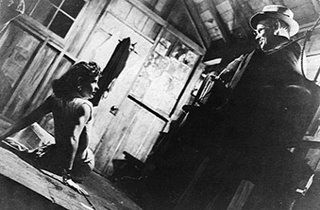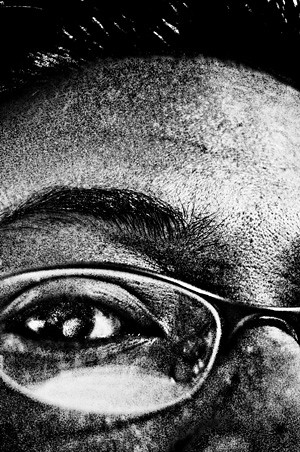
Whatever the reason, I manage to see Samuel Fuller's Pickup on South Street (1953) three times---more than anything I've seen of an Alfred Hitchcock film (well, I saw Psycho four times, not because I wanted to, but more of an academic demand). Probably because the Criterion DVD costs that much that repeated viewings are required to compensate for the twenty-five bucks I had to shed for it. No. I don't think so. I liked the film. I liked the taste of noir that Fuller delicately topped it. Bitter. Sweet. Dark. Like chocolate. A repetition is acquiring its flavor once again.
The movie begins in an unconventional way. A wordless subway sequence, no dialogues just the mechanical reverberation of the subway train--packed with the usual rush hour pedestrian traffic. We see the pouty-lipped Jean Peters in a vacant stare, unknowingly being watched by two men who appears (and we digress) to be either a cop or a mob man. In anyway, Fuller wouldn't let us know, until, of course as the film develops. In, comes Richard Widmark, ever cool, but beneath such coolness is his cunning ability to pick pockets. Grifting, as Fuller had come to term it, perhaps more of personal need to survive than a bending of social norms. Skip McCoy does what we expect him to do: grift. Yes, he did it. Now, we are audiences to what will transpire in the next hour.
The Double Complications
Candy doesn't know what she is carrying and Skip also carries no idea of what he grifted. His struggle to survive is his main concern. Whatever the purse contains, whether significant or not, it's none of his business. He exists in the simplicity of the film, its complications are the factors that will preclude Skip from living in that perspective. He has nothing to ruminate, except to avoid being apprehended. He sure has nothing to lose. However, everything changes the moment Skip filches Candy's purse. So, what are the two complications that arises from Skip's action? (1) both Skip and Candy's naivette--and the emergence of the microfilm contends to that; (2) the question of patriotism (rebuffing the federal agent's threat of treason with "are you waving the flag at me?") or a statement of survival (Thelma Ritter's Moe saying "we all have to eat").
The McGuffin
Alfred Hitchcock defined the McGuffin as something that contributes to the build-up of suspense. It could be a certain object that both the protagonist and the antagonists wanted, or perhaps a verbal information/secret that one has to utter and send the entire story in a zigzag course. Whatever it is, it has the capacity to turn things around, gives the film an interesting premise or, reveals a particular character's color. In Pickup, the McGuffin is the microfilm that Skip unknowingly pilfered from Candy's purse. It turns out to be an important piece of formula that the communists wanted. As it also turns out, both Skip and Candy becomes the McGuffin, personified, because they both have what the `villains' in the film wanted--the microfilm and themselves.
The Wrecking Crew
Fuller vehemently denied the anti-communist sentiments Pickup on South Street evidently expressed, but it seems during that time, it could be the appropriate film to simmer under his oven. Richard Kiley supported the cast as the quiet antagonist, Candy's manipulating paramour, a devious traitor who happens to be the one who will sell the microfilm to the communists. Furthermore, he assumes Candy's absolute loyalty to him, assuring her that after this delivery, there will be no more to follow. On the other hand, on Skip's opposite side of the battle is Detective Dan Tiger (played by Murvyn Pye), seeking to put the grifter away for life, but at the same time secretly hoping of his cooperation. He is the accidental hero, in a way, cloaked as the mean head of the pickpockets division of the Force.
The Stoolie
Thelma Ritter, was, as Fuller had described in his autobiography, the first person he casted in the film. She plays Moe, an informant (though she never uses such term to describe her willingness to help), a stoolie who sells tie and information in order to buy herself a decent cemetery plot. Her ultimate dream, perhaps, that she utters "If I was to be buried in Potter's Field, it'd just about kill me". She harbors deep respect and love for Skip, "I've known you since you were a kid", and would never have given him away. Survival is her game, though for one thing is a battle already half-lost.
In the large spectrum of the American film noir industry, Pickup on South Street is a definitive example. It defies the standards of the 50s censorship with its both near unpatriotism and extreme violence (I suggest to look out for the staircase scene), that for whatever reason I really enjoyed it.


No comments:
Post a Comment